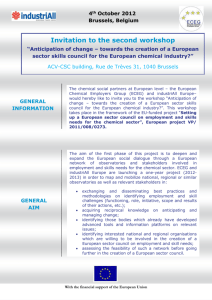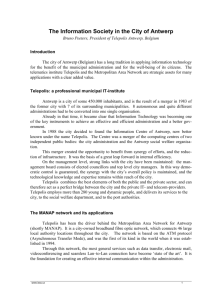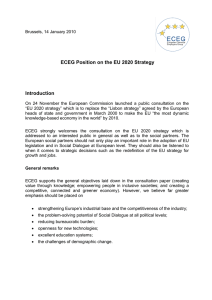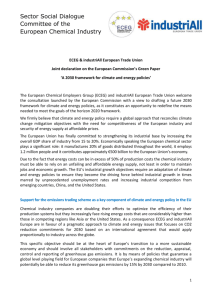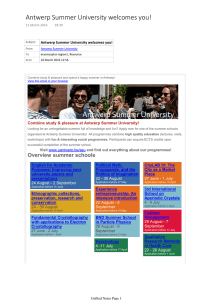eGovernance as a Challenge for the Knowledge Society
advertisement
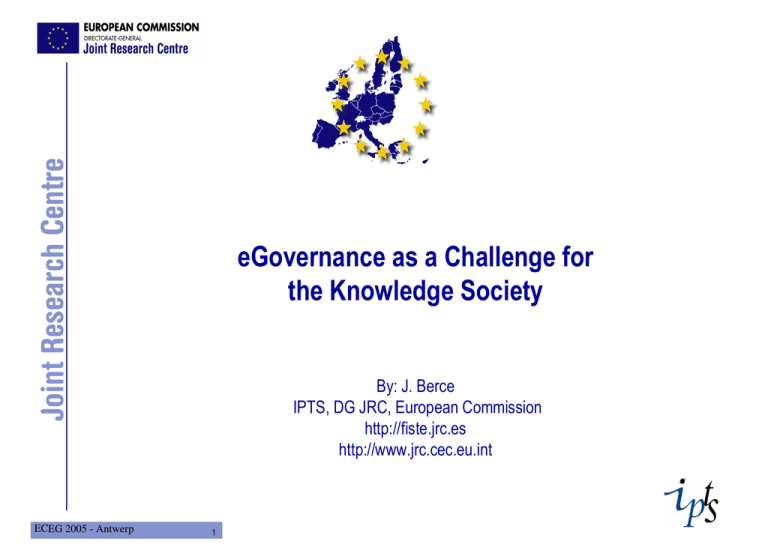
eGovernance as a Challenge for the Knowledge Society By: J. Berce IPTS, DG JRC, European Commission http://fiste.jrc.es http://www.jrc.cec.eu.int ECEG 2005 - Antwerp 1 The Institute for Prospective Technological Studies, IPTS Part of the DG JRC of the EC: 7 Institutes across Europe IPTS mission: “to provide customerdriven support to the EU policy-making process by researching science-based responses to policy challenges that have both a socio-economic as well as a scientific/technological dimension Institute for Prospective Technological Studies ECEG 2005 - Antwerp 2 IPTS tools for research: Participation in FP projects Open Calls … Content • • • • Introduction Background Reflections and Interpretations Conclusions ECEG 2005 - Antwerp 3 Introduction ECEG 2005 - Antwerp 4 Information Communications Technology (ICT) • iGovernment - converting existing processes and paper objects into digital form • eGovernment - representing the Internet - based digital services to non-government clients (citizens and businesses) • iGovernment and eGovernment with Infrastructure form ICT ECEG 2005 - Antwerp 5 Knowledge Management (KM) • Issues related to managing the knowledge assets of an organization, including: – – – – – – experts lessons learned documents artifact templates best practice and process improvement • To manage knowledge in an organization, there is a need to understand: – – – – ECEG 2005 - Antwerp what (organizational) knowledge is how it is used what its management consists of, and how we could improve organizational knowledge processes 6 Learning Organizations (LO) • [are] organizations where: – people continually expand their knowledge and skills-based capacity to create the results they truly desire – new and expansive patterns of thinking are nurtured – collective aspiration is set free and – people are continually learning to see the whole together ECEG 2005 - Antwerp 7 eGovernance • Is the next step to link public sector performance and behaviour to achieve: – – – – improved democracy wider social inclusion participation literacy, etc. • Is understood in this paper to be the strategic exercise of political and administrative authority to manage the nation’s affairs economically at all levels ECEG 2005 - Antwerp 8 Public administration • Some quotes: – The carrying out of policies established by the political (or policy making) elements of the government (Skok) – A public administration’s managerial approach is dependent on a structure arranged hierarchically (Rosenbloom) – A practice best understood as a system, with multiple external and internal factors that shape the behaviour of participants, activities of programmes and ultimate outcomes (Johnson) ECEG 2005 - Antwerp 9 The Knowledge Society • Where the older measures of competitiveness (Nath): – labour costs – resource endowments and – infrastructure • become superseded by dimensions such as: – – – – ECEG 2005 - Antwerp knowledge generation patents research & development and the availability of knowledge to citizens (or their ability to afford it) and their capacity to learn 10 Background ECEG 2005 - Antwerp 11 Slovenia • A small European country (2 million inhabitants) situated between Italy, Austria, Hungary, and Croatia. It joined the European Union (EU) in May 2004 ECEG 2005 - Antwerp 12 Research model and relations eGovernance Knowledge Management eGOVERNMENT INSTITUTION iGovernment eGovernment ICT - infrastructure ECEG 2005 - Antwerp 13 Learning Organization A survey • Sample of 288 different organizations, selected from the public sector in Slovenia, was chosen for the survey • 50% (143 organizations) responded to the questionnaires. The reply rate was as follows: – – – – ECEG 2005 - Antwerp from Ministries: 100% from Government offices: 83.3% from Local government offices: 94.6% from Municipalities: 22.9% 14 Research Question • This research addresses (some) public administration institutions from the point of view of the broad strategic impacts of effective eGovernance, with its scope focused on the roles of: – Information Communications Technology – Knowledge Management and – Learning Organization behaviour ECEG 2005 - Antwerp 15 Reflections and Interpretations ECEG 2005 - Antwerp 16 ICT Role • The data show that within the Slovenian administration ICT is well applied • 100% Internet availability reported at ministry level • A reduced willingness to use electronic doorways to open public sector services - fear of becoming more transparent – was perceived ECEG 2005 - Antwerp 17 Development of KM • The absence of a responsible person • No organizationally defined system of rewards that could stimulate KM • Slovenian Ministries tend to rely mainly on short training courses • Employee knowledge is not accurately monitored ECEG 2005 - Antwerp 18 Level of LO Culture • Respondents perceive that a paper format is the most important means for “storing” knowledge • Approximately half of the organizations in the OECD countries have reorganized their offices, whereas only one-third of those in Slovenia have done so • About 30% of respondents reported reorganization efforts and/or changes in the delegation of authority to lower hierarchical levels ECEG 2005 - Antwerp 19 eGovernance • Research showed that if a “poorly” organized system is digitalized, the efficiency gain from ICT is minimal • Results show the deficiency of new governance mechanisms - within researched Slovenian administration ECEG 2005 - Antwerp 20 Multidimensional Method eGovernment - Stage 4 Stage 3 Infor matio n Awa renes Visio s n and scope Rewa rding K& I Sha re Netw orkin g Ta ng ibl iGovernment Lev e Re s il ea nd i Stage 1 ien t to nta ng ibl Stage 2 er eso ch urc an Ch g es an ee gin nv ir o gb nm eah Le en vio a rn t rs ing an org db Pe an ele rm i z ive ati an s on en tL3 pro Inv ces (l i fes( olv l go o ing ng als - le all ,p a rn LO lan sta i ff ng s) cu ) ltu re ICT LO l of Slo ven ian eGo ver nan ce c apa bili ty Opportunities to improve KM ECEG 2005 - Antwerp 21 Conclusions ECEG 2005 - Antwerp 22 Conclusions - 1 • Only a strong interconnection between social, economic and Information Communications Technology factors can drive good eGovernance • These factors have an important impact on the evolution of public administration itself • Their interconnection involves: – knowledge management and networking – learning organization culture and behaviour – Information Communication Technology and good eGovernance delivery ECEG 2005 - Antwerp 23 Conclusions - 2 An organization must know: – what new things to embrace and when to embrace them. – what old things to discard and when to discard them ! To do so, it must strive to become a Learning Organization using Knowledge Management, supported by Information Communication Technology ECEG 2005 - Antwerp 24 eGovernance action plan (proposal) • With the ensuing strategic decisions, measures and priorities: – commitment of top government officials – an independent in-depth examination of current status – vision and goals to achieve eDemocracy through better eGovernance – predefined measurement system and priorities – responsibility of key actors to carry out selected tasks – a defined time-frame and – budgetary support ECEG 2005 - Antwerp 25 Thank you ! Website: http://fiste.jrc.es/ ECEG 2005 - Antwerp 26
